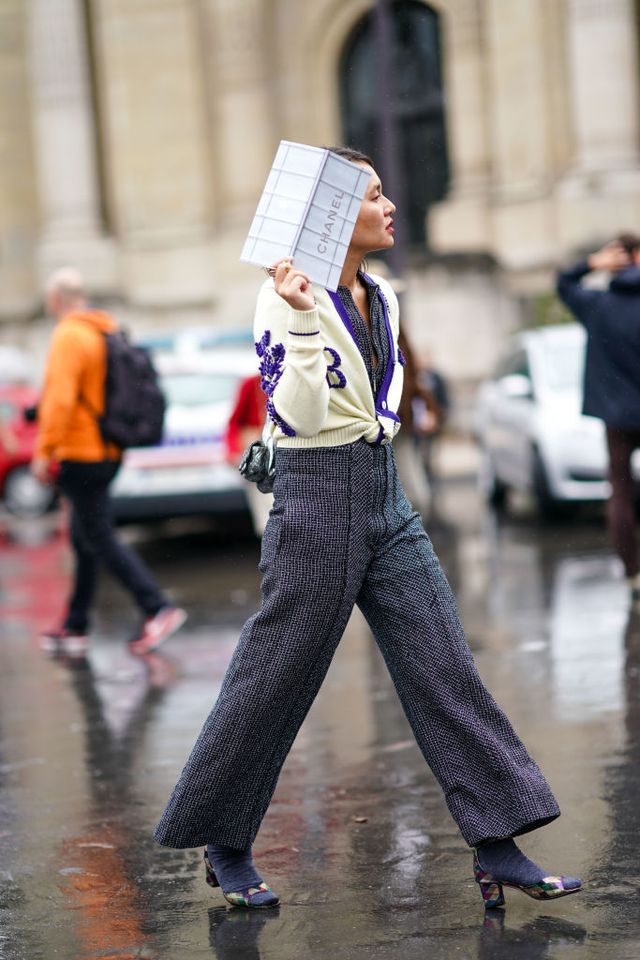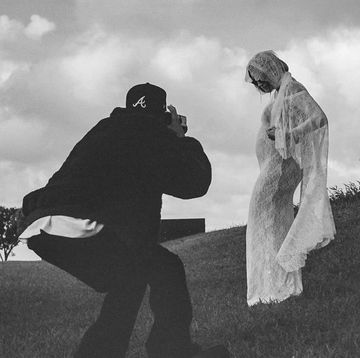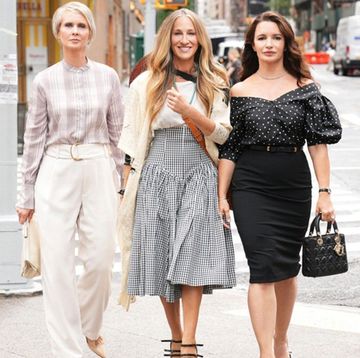I’ve always loved that point in conversation where one story has finished and received the appropriate laughs, and next comes that loaded question: ‘So, what do you do?’
For the past 10 years, I’ve been confident of my answer: ‘I’m a journalist and an editor.’
This was predictably almost always followed up by ‘That’s interesting, who for?’, then I’d get to really flex, because I’ve been the bigwig editor at cutting-edge media companies, from fashion magazine i-D to Refinery29 for close to four years.
What came with that was an enormous amount of social cachet, demonstrated through nodding heads and whispers of ‘cool’ and ‘wow’ when I told new acquaintances.
You see, that was the bulk of who I was in my twenties, until I realised that I couldn’t keep up with the fiercely ambitious and successful person I’d created. After all, it’s a vast space between how things sound at a party and how they feel day-to-day. And, at the too-young age of 31, after I’d worked so hard to get to where I was, I realised I no longer wanted it.
Ambition is a powerful motivator: the founding principle of the American Dream, what men are expected to have in abundance, and women are expected to have in a fair dose – enough to be attractive, but not so ambitious that you don’t have time to get a wax.
I was raised on ambition, taught that professional success is not just desirable but existential. My dad moved to the UK from Egypt and, at 66, still works 70 hours a week.
When he arrived in England, he stacked shelves and lived on cans of beans while he qualified as a doctor. This sort of story is common among immigrants, who often instil this work ethic into their children.
‘Do it until you fall down’ was the advice he gave me when I told him I found the pressures of my job too much. ‘If you’re comfortable, you’re failing’ was another mantra he passed down.
So, that’s exactly what I did. Until I fell down. I went from an intern at i-D to online editor at 23. It was 2010 and the ethos of digital media was to put in the hours and learn by doing.
I worked until 11pm, sometimes 4am, my relentless work ethic resulting in being dumped by my first love for choosing work over him. I ditched my friends, missed family get-togethers and prided myself on being late to everything because I was so busy. I was obsessed with my job and the world it connected me to – Paris Fashion Week, interviewing Ryan Gosling, travelling to Beijing to write cover stories – it was a dream, so of course I gave my whole self to it.
I considered myself ‘a career woman’ at 23 when my friends were, age-appropriately, figuring out what they wanted to do.
I became i-D’s deputy editor, then acting editor at 27 – I’d somehow convinced my bosses I was unflappable. Days were filled with hourly deadlines and aggressive weekly targets. When friends asked about work, I’d compare it to running on a treadmill with someone constantly speeding it up.
I smoked on the way to work, drank most nights, took recreational drugs at weekends and sleeping tablets in the week. I huffed at slow walkers, late Ubers and baristas who spent too long on my cappuccino. Under the stress of success, I felt the sweet parts of my personality harden.
In my late twenties, I was approached to be the founding editor of Refinery29 in the UK. I was in therapy at the time, trying to process some things that had happened in my family, but I found myself talking about work more than anything else.
I had a few editor job offers on the table, which I presented to my therapist in the form of pros and cons. ‘But which do you want?’ she asked. The question flummoxed me because what I wanted was to be a success. ‘It’s a shame, Sarah,’ she responded. ‘Because that never seemed to make you happy before.’
Does anyone truly enjoy the view from the top of the ladder? It feels sweet for a few minutes, but there are so many hidden costs and broken pegs. I was going through another break-up at the time, with someone who I felt wasn’t ambitious enough. In our final goodbye, he said: ‘I really tried to show you that work isn’t everything. I don’t think I succeeded.’
After six whirlwind years, I left i-D to take the Refinery29 role, mainly because I was in awe of my sharp, funny boss who articulated herself perfectly at 100mph.
She seemed invincible; that was what I wanted to be. My salary jumped into a higher tax bracket, I got to pick my team, and together we started working on the stories that we felt needed to be told. Things moved quickly – within a year of launching, we’d won several awards for our stories, which were reaching millions of women – and I was invited to Facebook and the Cabinet Office to advise their teams on how to speak to young women.
It was all going brilliantly. Yet, the more brilliantly it went, the more panicked I felt. I started taking beta blockers to control my anxiety about public speaking, I couldn’t sleep more than two hours a night.
I began to feel less like the charming, informed woman in the media I was employed to be. I had a recurring dream where I needed to get to school to sit an exam, but the friction on the ground was too forceful; I tried to crawl, but made no progress.
And, just like that, I burned out.
After three years in the job, and nearly 10 in the media, the force that had been pushing me forward, that ‘ambition’ I’d always felt as a physical thing driving my body, started to do a U-turn. Editorial meetings I’d once led with vigour felt intimidating. I sat at my desk staring blankly at my to-do list, watching hundreds of emails requiring my attention roll in. I’d run out of ideas. I looked around the office and couldn’t understand how everyone else was so energetic.
‘You’re talking like you’re 61, not 31,’ Mum said on the phone, hearing the disillusionment in my voice. I sat with my bosses to explain what was happening and, though they were supportive – full of inspiring words that would have made the old me jump up and get to it, desperate to please and achieve – the new, zombie-me couldn’t hear it. Or didn’t want to.
Friends and family told me to keep going; after all, I had the dream job, who wouldn’t want it? I’d always been conscientious, but all I could think about was running away, to a place where no one expected anything of me.
My new boyfriend had talked about living abroad – his ambition was to work in East Africa. Since my ambition appeared to be lost, I decided to give his a try. I was supposed to be writing a book with a friend, which I’d been neglecting, so I figured I’d go and live a leisurely writer’s life. A few weeks later, I handed in my notice, torn between FOMO for the things my team would achieve without me and the excitement of the unknown ahead.
My dad’s response was predictably brutal, but feminist to the core: ‘I didn’t raise you to be the girlfriend of somebody who has a job in Africa.’
He had a point; I had left the top job at a female-led media company to move across the world for my boyfriend’s job. But at that time, I found the idea of not being the successful one a huge relief.
Just like that, we packed up and went. Meeting new people in Kenya, however, I found myself stuttering over the ‘what do you do?’ question. Writing a book about social media didn’t feel as impressive as being an editor of a fashion media brand, especially compared to the NGO workers who spent their days advising on Aids prevention or supporting women in prisons.
Inevitably, in those first few months, I felt as though, along with my ambition, I’d lost my identity. If I wasn’t a hotshot editor, I must be nothing at all.
But, almost imperceptibly, I began to appreciate the new pace of life. I wrote the book, went hiking, slept well for the first time in years. Less ambition started to feel good. I missed the people I’d worked with, but I didn’t miss the frantic person I’d been. Over time, I grew unfazed by the impressive things my peers were doing, and more attuned to what I wanted.
I’d had a quiet ambition to become a psychotherapist for a long time, and in this new head space, I found the drive to pursue it. It will take ages (five years!) to retrain. It’s not going to be glamorous, and I’ll be the least outwardly successful of my friends. But I feel excited again, like I’m at the bottom of a mountain that can only be climbed slowly. The whole point about ambition is that it needs a goal to exist, but when the goal changed for me, so did the type of ambition.
‘The struggle itself toward the heights is enough to fill a man’s heart’, Albert Camus wrote in The Myth Of Sisyphus. I reached a great height in my media career, and I’m proud of that, but at the top, my heart felt empty.
These days, I’m the person people call when they’re feeling disillusioned and wondering whether to run away to a shack on the beach. More often than not I say, ‘Do it, go see who you are and what ambition means to you when you’re standing outside of the rat race’. For me, it meant rediscovering a new, slower-paced ambition that I hope thrives on the struggle as much as it does on the end goal of success.
Mixed Feelings: Exploring the Emotional Impact of our Digital Habits by Naomi Shimada and Sarah Raphael is out now
This article originally appears in ELLE's November issue, on newsstands now!















